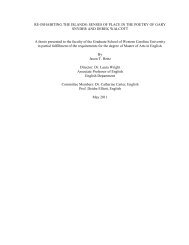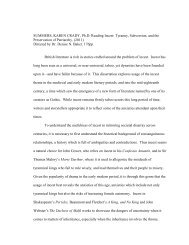Song Character Analysis Worksheet - The University of North ...
Song Character Analysis Worksheet - The University of North ...
Song Character Analysis Worksheet - The University of North ...
Create successful ePaper yourself
Turn your PDF publications into a flip-book with our unique Google optimized e-Paper software.
gossip columns. 17 Exploitation on both sides escalated to such an extent that by 1919<br />
when the Ziegfeld musical comedy Golddiggers satirized the contemporary male view<br />
that “all women <strong>of</strong> the theatre are chiselers,” the audience accepted it as a given fact and<br />
enjoyed the joke. 18<br />
<strong>The</strong> stereotype <strong>of</strong> chorus girls and actresses as being sexually aware and promis-<br />
cuous heightened their onstage persona and the audience’s enjoyment. An actress could<br />
not be taken seriously with a virginal persona, for how then could she interpret passionate<br />
roles or give full weight to the sexual innuendos <strong>of</strong> musical comedy? This expectation <strong>of</strong><br />
illicit passion was not a pr<strong>of</strong>essional requirement for male actors, however. Women were<br />
portrayed by stereotypes that described physical demeanor or sexual proclivity (blonde<br />
bombshell, femme fatale, vamp, gamine, and sex goddess), while male types were por-<br />
trayed by career specifications (cowboy, gangster, newsman, hero, or villain). 19 This<br />
practice <strong>of</strong> gender role stereotyping further established the hegemonic view <strong>of</strong> woman as<br />
a sexual object and provided a socialized excuse for looking.<br />
<strong>The</strong> Feminine Audience View<br />
<strong>The</strong> feminine viewpoint <strong>of</strong> female stage performers was sharply divided by the<br />
uneasy coexistence <strong>of</strong> traditional Victorian morals and modern New Woman aesthetic.<br />
<strong>The</strong> stereotype <strong>of</strong> the female patron was a genteel, middle class puritan who appreciated<br />
17 Eva Rieger discussed this practice in “‘Dolce semplice?’ On the Changing Role <strong>of</strong> Women in<br />
Music” in Feminist Aesthetics, 145.<br />
<strong>of</strong> stage personae.<br />
18 <strong>The</strong> feminine view was “either you work the men, or the men work you.” Mizejewski, 72.<br />
19 See Berlanstein, p. 124, and Fischer, p. 74, for more discussion on gender roles and mythology<br />
62

















